Introduction
This blog features 50 influential Christians who positively contributed to the world.
It covers 2000 years, commencing with Paul the Apostle and finishing with Brother Andrew, the founder of an organisation that provides Bibles to persecuted Christians in over 60 countries worldwide.
If you liked this blog, please visit Another 50 Famous Christians in History.
Please leave a comment.
The first 10 Influential Christians
 Paul the Apostle (c. 5 AD – c. 67 AD): Paul, originally known as Saul of Tarsus, played a pivotal role in the spread of Christianity beyond Jewish communities into the Greco-Roman world. Before his conversion on the road to Damascus, he was a persecutor of Christians. Afterwards, he became perhaps the most significant early Christian missionary. His epistles (letters) to early Christian communities form a substantial portion of the New Testament. Paul’s theological insights and emphasis on grace, faith, and the Christ event as central to salvation have profoundly influenced Christian thought and practice. His missionary journeys across the Mediterranean, establishment of Christian communities, and enduring written legacy through his letters have made him a central figure in Christian history and theology.
Paul the Apostle (c. 5 AD – c. 67 AD): Paul, originally known as Saul of Tarsus, played a pivotal role in the spread of Christianity beyond Jewish communities into the Greco-Roman world. Before his conversion on the road to Damascus, he was a persecutor of Christians. Afterwards, he became perhaps the most significant early Christian missionary. His epistles (letters) to early Christian communities form a substantial portion of the New Testament. Paul’s theological insights and emphasis on grace, faith, and the Christ event as central to salvation have profoundly influenced Christian thought and practice. His missionary journeys across the Mediterranean, establishment of Christian communities, and enduring written legacy through his letters have made him a central figure in Christian history and theology.- Augustine of Hippo (354 AD – 430 AD): Augustine was a theologian and philosopher who became the bishop of Hippo Regius (modern-day Annaba, Algeria). His writings, including “Confessions” and “The City of God,” profoundly influenced Christian doctrine and Western philosophy. Augustine’s conversion to Christianity after a life of secular pursuits and his subsequent theological reflections on grace, free will, and original sin have made him a pivotal figure in the development of Western Christianity and philosophy. His thoughts on the nature of the church, the relationship between the city of man and the city of God, and his development of Christian doctrine are foundational to Christian theology.
- Benedict of Nursia (480 AD – 547 AD): Saint Benedict is most renowned for his Rule of Saint Benedict, a set of guidelines for monastic life that emphasised prayer, work, and communal living according to Christian principles. His rule became the foundation of Benedictine monasticism, profoundly influencing the West’s Christian monastic movement. Benedict’s emphasis on stability, community life, and the balance between prayer and work in pursuing spiritual goals helped shape Western monasticism. It contributed to the preservation of learning and culture through the Middle Ages.
- Francis of Assisi (1181/1182 AD – 1226 AD): Saint Francis is celebrated for embracing poverty, love for nature, and dedication to peace and compassion. He founded the Franciscan Order, which was committed to preaching, caring for the poor, and living in harmony with the natural world. Francis is remembered for his stigmata, his Canticle of the Sun praising God’s creation, and his role in developing the Nativity scene to celebrate Christmas. His life and teachings have inspired millions to seek simplicity and dedicate themselves to serving others and caring for the environment.
- Thomas Aquinas (1225 AD – 1274 AD): Saint Thomas Aquinas was a Dominican friar, theologian, and Doctor of the Church, best known for his comprehensive work, the Summa Theologica, which aimed to present the entirety of Christian theology in a systematic and rational format. Aquinas worked to reconcile Christianity with the rediscovered philosophy of Aristotle, arguing that faith and reason are not opposed but complementary. His contributions to natural law, ethics, and the philosophy of being have had a lasting impact on Western thought, making him a central figure in theology and philosophy.
- Catherine of Siena (1347 AD – 1380 AD): Saint Catherine of Siena was a mystic, activist, and author who profoundly influenced the Catholic Church. She is best known for her major work, “The Dialogue of Divine Providence,” a conversation between the soul and God, which she dictated during a state of ecstasy. Catherine dedicated her life to the church and the papacy, working tirelessly for the clergy’s reform and the Pope’s return from Avignon to Rome, which she saw as essential for the church’s unity and spiritual authority. Her efforts contributed significantly to the return of the Papacy to Rome from its “Babylonian Captivity” in Avignon. Catherine was canonised in 1461 and is one of Europe’s six patron saints.
 Martin Luther (1483 AD – 1546 AD): Martin Luther was a seminal figure in the Protestant Reformation. His posting of the Ninety-Five Theses on the door of the Wittenberg Castle Church in 1517 protested against the sale of indulgences and other ecclesiastical abuses. Luther’s translation of the Bible into German made the scriptures more accessible to the general public, which had a tremendous impact on the church and German culture. His teachings on justification by faith alone, the priesthood of all believers, and the authority of the scriptures over church tradition fundamentally changed the Christian landscape, leading to the formation of the Lutheran Church and influencing other Protestant traditions.
Martin Luther (1483 AD – 1546 AD): Martin Luther was a seminal figure in the Protestant Reformation. His posting of the Ninety-Five Theses on the door of the Wittenberg Castle Church in 1517 protested against the sale of indulgences and other ecclesiastical abuses. Luther’s translation of the Bible into German made the scriptures more accessible to the general public, which had a tremendous impact on the church and German culture. His teachings on justification by faith alone, the priesthood of all believers, and the authority of the scriptures over church tradition fundamentally changed the Christian landscape, leading to the formation of the Lutheran Church and influencing other Protestant traditions.- John Calvin (1509 AD – 1564 AD): John Calvin was a French theologian, pastor, and reformer in Geneva during the Protestant Reformation. He is the principal figure of Calvinism and is best known for his influential work, “Institutes of the Christian Religion,” a systematic presentation of Protestant theology. Calvin’s teachings on the sovereignty of God, predestination, and the absolute authority of scripture reshaped Christianity, leading to the establishment of Reformed churches across Europe and beyond. His emphasis on a disciplined, moral life and the autonomy of the local congregation has had a lasting impact on Protestantism.
- Teresa of Ávila (1515 AD – 1582 AD): Saint Teresa of Ávila was a Spanish mystic, reformer, and writer during the Counter-Reformation. She is known for contributing to Christian mysticism and reforming the Carmelite Order. Teresa’s writings, including “The Interior Castle” and “The Way of Perfection,” explore the spiritual journey towards mystical union with God and are considered classics of Christian mysticism. Her work reforming the Carmelite Order, emphasising contemplation, simplicity, and community life, revitalised the order and significantly influenced Christian spirituality.
- John Wesley (1703 AD – 1791 AD): John Wesley was an Anglican cleric and theologian who founded Methodism along with his brother Charles Wesley and fellow cleric George Whitefield. His open-air preaching to those excluded from the Anglican Church, his organisation of Methodist societies, and his development of a systematic approach to religious study and self-examination led to the establishment of the Methodist movement. Wesley’s emphasis on personal piety and social justice and his innovative use of small groups for spiritual growth and accountability (class meetings) significantly impacted Christian practice and the revival movement in the 18th century.
Ten More Influential Christians
 William Wilberforce (1759 AD – 1833 AD): William Wilberforce was a British politician, philanthropist, and a leader of the movement to stop the slave trade. A profoundly religious man, Wilberforce was convinced of the moral wrongness of slavery and spent much of his life campaigning against it. His efforts culminated in the passage of the Slave Trade Act in 1807, which abolished the slave trade in the British Empire, and eventually the Slavery Abolition Act of 1833, which outlawed slavery itself throughout the British colonies. His dedication to social reform also extended to issues like animal cruelty and education for the poor, making him a key figure in the social justice movements of his time.
William Wilberforce (1759 AD – 1833 AD): William Wilberforce was a British politician, philanthropist, and a leader of the movement to stop the slave trade. A profoundly religious man, Wilberforce was convinced of the moral wrongness of slavery and spent much of his life campaigning against it. His efforts culminated in the passage of the Slave Trade Act in 1807, which abolished the slave trade in the British Empire, and eventually the Slavery Abolition Act of 1833, which outlawed slavery itself throughout the British colonies. His dedication to social reform also extended to issues like animal cruelty and education for the poor, making him a key figure in the social justice movements of his time.- Elizabeth Fry (1780 AD – 1845 AD): Elizabeth Fry was an English Quaker prison reformer, social reformer, and philanthropist. She is best known for improving conditions for women prisoners in the early 19th century. Fry visited Newgate Prison in 1813 and was appalled by the conditions. She established the Association for the Improvement of the Female Prisoners in Newgate, which provided primary education and religious instruction. Fry’s efforts led to widespread prison reform in Britain and beyond, and she became the first woman to give evidence before a parliamentary committee, significantly influencing legislation.
- Hudson Taylor (1832 AD – 1905 AD): James Hudson Taylor was a British Protestant Christian missionary to China and founded the China Inland Mission (CIM), now known as OMF International. Taylor spent 51 years in China, and his innovative approach to missions included adopting Chinese clothing and customs, which was revolutionary at the time. Under his leadership, the CIM brought over 800 missionaries to the country, which began 125 schools and resulted in 18,000 Christian conversions. Taylor’s life and work played a significant role in shaping modern Christian missions.
 Florence Nightingale (1820 AD – 1910 AD): Florence Nightingale, known as “The Lady with the Lamp,” was a British social reformer and the founder of modern nursing. She came to prominence while serving as a manager and trainer of nurses during the Crimean War, where she organised care for wounded soldiers. She established the first scientifically based nursing school, the Nightingale School of Nursing, at St. Thomas’ Hospital in London in 1860. Nightingale’s efforts to reform healthcare significantly improved the quality and respectability of the nursing profession. Her work in statistics, especially in data visualisation, significantly contributed to the development of medical epidemiology.
Florence Nightingale (1820 AD – 1910 AD): Florence Nightingale, known as “The Lady with the Lamp,” was a British social reformer and the founder of modern nursing. She came to prominence while serving as a manager and trainer of nurses during the Crimean War, where she organised care for wounded soldiers. She established the first scientifically based nursing school, the Nightingale School of Nursing, at St. Thomas’ Hospital in London in 1860. Nightingale’s efforts to reform healthcare significantly improved the quality and respectability of the nursing profession. Her work in statistics, especially in data visualisation, significantly contributed to the development of medical epidemiology.- George Müller (1805 AD – 1898 AD): George Müller was a Christian evangelist and the director of the Ashley Down orphanage in Bristol, England. He is best known for his faith and prayer-based approach to providing for the needs of the orphans under his care without ever requesting financial support. Müller established 117 schools that offered Christian education to over 120,000 children, many of them orphans. His reliance on God’s provision rather than fundraising efforts inspired many and demonstrated the practical application of faith in God to meet material needs.
- William Booth (1829 AD – 1912 AD): William Booth was a British Methodist preacher who founded The Salvation Army, a Christian denominational church and international charitable organisation known for its work with the impoverished and destitute. Initially a minister in the Methodist New Connexion, Booth became an independent evangelist, focusing on reaching the masses in London’s East End. Under Booth’s leadership, the Salvation Army combined evangelical work with social aid, providing food, shelter, and employment to needy people while advocating for social reforms. Booth’s vision was to bring salvation to the poor, needy, and hungry by meeting their physical and spiritual needs.
- Catherine Booth (1829 AD – 1890 AD): Catherine Booth, co-founder of The Salvation Army alongside her husband William Booth, was instrumental in establishing the Army’s structure and methods. Known as the “Mother of The Salvation Army,” she was a powerful speaker and advocate for women’s rights within the church, insisting on women’s right to preach and be equal partners in the mission. Catherine’s theological writings and passionate orations played a crucial role in shaping the Salvation Army’s focus on social salvation, emphasising the importance of practical Christianity and social justice.
 Dwight L. Moody (1837 AD – 1899 AD): Dwight Lyman Moody was an American evangelist and publisher who founded the Moody Church, Moody Bible Institute, and Moody Publishers. One of the most famous evangelists of the 19th century, Moody led a revivalist movement in the United States and Britain, preaching to millions of people and converting many to Christianity. His emphasis on a personal relationship with Jesus Christ and the need for the Holy Spirit’s empowerment in life and ministry had a lasting impact on evangelical Christianity. Moody’s educational and publishing efforts aimed to provide quality Christian education and literature to support the spiritual growth of believers.
Dwight L. Moody (1837 AD – 1899 AD): Dwight Lyman Moody was an American evangelist and publisher who founded the Moody Church, Moody Bible Institute, and Moody Publishers. One of the most famous evangelists of the 19th century, Moody led a revivalist movement in the United States and Britain, preaching to millions of people and converting many to Christianity. His emphasis on a personal relationship with Jesus Christ and the need for the Holy Spirit’s empowerment in life and ministry had a lasting impact on evangelical Christianity. Moody’s educational and publishing efforts aimed to provide quality Christian education and literature to support the spiritual growth of believers.- Charles Spurgeon (1834 AD – 1892 AD): Charles Haddon Spurgeon, known as the “Prince of Preachers,” was a British Baptist preacher who remains highly influential among Christians of various denominations. He was a vital figure in the Reformed Baptist tradition, defending the Church in agreement with the 1689 London Baptist Confession of Faith. Spurgeon’s sermons, numbering over 3,600, are still widely read and distributed today. He founded the Metropolitan Tabernacle in London, where he drew large crowds with his eloquent and powerful preaching. Spurgeon also established a pastors’ college, an orphanage, and other charitable works, demonstrating his commitment to the Gospel and social action.
- Amy Carmichael (1867 AD – 1951 AD): Amy Carmichael was an Irish missionary in India, where she worked for 55 years without furlough and founded the Dohnavur Fellowship, a refuge for children rescued from being forced into temple prostitution. Carmichael’s mission began with her work among the slums of Belfast, but she is most noted for her work in India, where she served as a protector and a mother figure to over a thousand children. She wrote many books about missionary work and her life in India, emphasising faith, sacrifice, and the love of Christ, influencing many to consider missions or deepen their commitment to Christ.
Another 10 Influential Christians
- Dietrich Bonhoeffer (1906 AD – 1945 AD): Dietrich Bonhoeffer was a German Lutheran pastor, theologian, anti-Nazi dissident, and key founding member of the Confessing Church. His writings on Christianity’s role in the secular world have become widely influential, and his book “The Cost of Discipleship” is considered a classic. Bonhoeffer was involved in plans by members of the Abwehr (the German Military Intelligence Office) to assassinate Adolf Hitler and was arrested in April 1943. He was executed by hanging in April 1945, just weeks before the end of World War II in Europe, becoming a martyr for his faith and resistance to tyranny.
- Albert Schweitzer (1875 AD – 1965 AD): Albert Schweitzer was an Alsatian polymath who won the Nobel Peace Prize in 1952 for his philosophy of “Reverence for Life,” expressed through his foundational work in establishing the Albert Schweitzer Hospital in Lambaréné, now in Gabon. A theologian, organist, writer, humanitarian, philosopher, and physician, Schweitzer challenged both the secular and religious thought of his day, advocating for a deep respect for all living things and a commitment to serving humanity. His work in Gabon as a medical missionary set a new standard for medical missions and demonstrated the practical application of his ethical philosophy.
- Corrie Ten Boom (1892 AD – 1983 AD): Corrie Ten Boom was a Dutch Christian who, along with her family, helped many Jews escape the Nazi Holocaust during World War II by hiding them in her home. She was arrested for her actions and sent to Ravensbrück concentration camp. After her release, she wrote “The Hiding Place,” a book that recounts the story of her family’s efforts and her spiritual experiences in the camp. Ten Boom travelled widely as a public speaker, recounting her experiences during the war and spreading her message of forgiveness, healing, and hope in Christ.
- Mother Teresa (1910 AD – 1997 AD): Mother Teresa, known in the Catholic Church as Saint Teresa of Calcutta, was an Albanian-Indian Roman Catholic nun and missionary. She founded the Missionaries of Charity, a religious congregation with over 4,500 nuns and was active in 133 countries by her death. The congregation manages homes for people dying of HIV/AIDS, leprosy, and tuberculosis, soup kitchens, dispensaries, mobile clinics, children’s and family counselling programs, and orphanages. She was internationally famed as a humanitarian and advocate for the poor and helpless, which led to her being awarded the Nobel Peace Prize in 1979.
 Martin Luther King Jr. (1929 AD – 1968 AD): Martin Luther King Jr. was an American Baptist minister and activist who became the most visible spokesperson and leader in the Civil Rights Movement from 1955 until his assassination in 1968. King was known for his role in advancing civil rights using nonviolent civil disobedience based on his Christian beliefs. He led the 1955 Montgomery bus boycott and helped found the Southern Christian Leadership Conference in 1957. He delivered the iconic “I Have a Dream” speech during the 1963 March on Washington, advocating for an end to racism. King was awarded the Nobel Peace Prize in 1964 for combating racial inequality through nonviolent resistance.
Martin Luther King Jr. (1929 AD – 1968 AD): Martin Luther King Jr. was an American Baptist minister and activist who became the most visible spokesperson and leader in the Civil Rights Movement from 1955 until his assassination in 1968. King was known for his role in advancing civil rights using nonviolent civil disobedience based on his Christian beliefs. He led the 1955 Montgomery bus boycott and helped found the Southern Christian Leadership Conference in 1957. He delivered the iconic “I Have a Dream” speech during the 1963 March on Washington, advocating for an end to racism. King was awarded the Nobel Peace Prize in 1964 for combating racial inequality through nonviolent resistance.- Billy Graham (1918 AD – 2018 AD): Billy Graham was an American evangelical Christian evangelist and an ordained Southern Baptist minister who became well-known internationally in the late 1940s. He held large indoor and outdoor rallies with sermons broadcast on radio and television; some were still being re-broadcast into the 21st century. Graham conducted over 400 crusades in 185 countries and territories on six continents. He provided spiritual counsel for every president, from Harry Truman to Barack Obama, and was particularly noted for his influence on the spiritual lives of the American leadership. Graham preached the Gospel to more people in live audiences than anyone else in history.
- C.S. Lewis (1898 AD – 1963 AD): Clive Staples Lewis was a British writer and lay theologian. He held academic positions in English literature at Oxford University (Magdalen College, 1925–1954) and Cambridge University (Magdalene College, 1954–1963). He is best known for his works of fiction, especially “The Screwtape Letters,” “The Chronicles of Narnia,” and “The Space Trilogy,” and for his non-fiction Christian apologetics, such as “Mere Christianity,” “Miracles,” and “The Problem of Pain.” His works have been translated into over 30 languages and have sold millions of copies. The books that make up “The Chronicles of Narnia” have been particularly influential on the Christian thought and spiritual growth of many.
- Elisabeth Elliot (1926 AD – 2015 AD): Elisabeth Elliot was an American Christian author and speaker. Her first husband, Jim Elliot, was one of five missionaries killed in 1956 while attempting to evangelise the Waodani people of Ecuador. Elisabeth continued her missionary work in Ecuador and became an influential author and speaker. Her books, including “Through Gates of Splendor,” “Shadow of the Almighty: The Life and Testament of Jim Elliot,” and “Passion and Purity,” have inspired millions to take their faith seriously. She addressed obedience, sacrifice, and faithfulness to God’s call.
 Desmond Tutu (1931 AD – 2021 AD): Desmond Mpilo Tutu was a South African Anglican bishop and theologian known for his anti-apartheid and human rights activist work. He was the Bishop of Johannesburg from 1985 to 1986 and then the Archbishop of Cape Town from 1986 to 1996, in both cases being the first black African to hold the position. Theologically, he sought to fuse the Anglican tradition with African traditions and was a prominent leader in the crusade for a democratic and free South Africa. Tutu’s work earned him the Nobel Peace Prize in 1984. He was also known for his work as the Truth and Reconciliation Commission Chair, a body assembled in South Africa after the abolition of apartheid.
Desmond Tutu (1931 AD – 2021 AD): Desmond Mpilo Tutu was a South African Anglican bishop and theologian known for his anti-apartheid and human rights activist work. He was the Bishop of Johannesburg from 1985 to 1986 and then the Archbishop of Cape Town from 1986 to 1996, in both cases being the first black African to hold the position. Theologically, he sought to fuse the Anglican tradition with African traditions and was a prominent leader in the crusade for a democratic and free South Africa. Tutu’s work earned him the Nobel Peace Prize in 1984. He was also known for his work as the Truth and Reconciliation Commission Chair, a body assembled in South Africa after the abolition of apartheid.- Oscar Romero (1917 AD – 1980 AD): Óscar Arnulfo Romero y Galdámez was a Salvadoran Roman Catholic bishop and the fourth Archbishop of San Salvador. He spoke out against poverty, social injustice, assassinations, and torture amid the growing conflict between the military government and leftist groups that led to the Salvadoran Civil War. In 1980, Romero was assassinated while offering Mass in the chapel of the Hospital of Divine Providence. He became a voice for the voiceless poor, and his teachings and legacy have profoundly impacted the Church and the world’s view of human rights. Romero was canonised as a saint by Pope Francis in 2018.
More Influential Christians
- Jean Vanier (1928 AD – 2019 AD): Jean Vanier was a Canadian Catholic philosopher, theologian, and humanitarian. In 1964, he founded L’Arche, an international federation of communities spread over 37 countries for people with developmental disabilities and those who assist them. Vanier’s philosophy was that people with disabilities are teachers of tenderness and humility rather than merely the recipients of charity, and he promoted a community model where people of differing abilities live and work together. His work has significantly influenced contemporary understandings of how society can and should integrate people with disabilities.
- Francis Chan (1967 AD – Present): Francis Chan is an American Protestant author, teacher, and preacher. He is the former teaching pastor of Cornerstone Community Church in Simi Valley, California, which he founded in 1994. Chan is known for his passionate biblical teachings and has written several influential books, including “Crazy Love: Overwhelmed by a Relentless God” and “Forgotten God: Reversing Our Tragic Neglect of the Holy Spirit.” His focus on the importance of a loving relationship with God and the need for a radical Christian life beyond comfort and personal gain has challenged and inspired many believers worldwide.
 Nicky Gumbel (1955 AD – Present): Nicky Gumbel is a British Anglican priest and the pioneer of the Alpha Course, an introductory course to the Christian faith attended by millions worldwide. Gumbel took over the running of Alpha at Holy Trinity Brompton Church in London in 1990 and transformed it from a local course for new Christians into a global phenomenon. The Alpha Course has been instrumental in evangelism and church growth, offering a relaxed, friendly, and welcoming approach to exploring the big questions of life and the basics of Christian faith. Gumbel’s work through Alpha has significantly impacted global Christianity by facilitating open discussions about faith, life, and God.
Nicky Gumbel (1955 AD – Present): Nicky Gumbel is a British Anglican priest and the pioneer of the Alpha Course, an introductory course to the Christian faith attended by millions worldwide. Gumbel took over the running of Alpha at Holy Trinity Brompton Church in London in 1990 and transformed it from a local course for new Christians into a global phenomenon. The Alpha Course has been instrumental in evangelism and church growth, offering a relaxed, friendly, and welcoming approach to exploring the big questions of life and the basics of Christian faith. Gumbel’s work through Alpha has significantly impacted global Christianity by facilitating open discussions about faith, life, and God.- John Stott (1921 AD – 2011 AD): John Robert Walmsley Stott was an English Anglican cleric and theologian who was noted as a leader of the worldwide evangelical movement. He was one of the principal authors of the Lausanne Covenant in 1974. Stott’s influential books, such as “Basic Christianity,” “The Cross of Christ,” and “The Contemporary Christian,” have shaped the understanding and articulation of Christianity for millions around the globe. He was also known for his preaching and commitment to the global church, which included significant contributions to Christian missions and training Christian leaders in the Majority World.
- Henri Nouwen (1932 AD – 1996 AD): Henri J.M. Nouwen was a Dutch Catholic priest, professor, writer, and theologian. His works are widely read today and deal with spirituality, social justice, and psychology. Nouwen taught at several theological institutes and universities, including the University of Notre Dame, Yale Divinity School, and Harvard Divinity School. In later life, he shared his life with people with mental disabilities as a pastor of the L’Arche Daybreak community in Canada. His books, such as “The Wounded Healer,” “Life of the Beloved,” and “The Return of the Prodigal Son,” have inspired millions with their insight into the human condition and the love of God.
 Philip Yancey (1949 AD – Present): Philip Yancey is an American author who writes about questions and topics involving the Christian faith that many find difficult or controversial. Yancey has won numerous awards for his writing, including thirteen Gold Medallion Awards from the Evangelical Christian Publishers Association. His books, such as “What’s So Amazing About Grace?” and “The Jesus I Never Knew,” explore the depth of God’s grace and the person of Jesus Christ in a way that seeks to make faith relevant to a broader audience. Yancey’s writings encourage readers to grapple with their faith and doubts, emphasising God’s love and grace amidst suffering and confusion.
Philip Yancey (1949 AD – Present): Philip Yancey is an American author who writes about questions and topics involving the Christian faith that many find difficult or controversial. Yancey has won numerous awards for his writing, including thirteen Gold Medallion Awards from the Evangelical Christian Publishers Association. His books, such as “What’s So Amazing About Grace?” and “The Jesus I Never Knew,” explore the depth of God’s grace and the person of Jesus Christ in a way that seeks to make faith relevant to a broader audience. Yancey’s writings encourage readers to grapple with their faith and doubts, emphasising God’s love and grace amidst suffering and confusion.- Gary Haugen (1963 AD – Present): Gary Haugen is an American attorney and the founder and CEO of the International Justice Mission (IJM). This global organisation protects the poor from violence in the developing world. Before founding IJM in 1997, Haugen was involved in the investigation of the Rwandan genocide for the United Nations. IJM works to combat human trafficking, slavery, sexual exploitation, and other forms of violent oppression. Haugen’s leadership in advocating for the protection of the most vulnerable members of society has brought international attention to issues of justice and human rights. His work emphasises the Christian call to justice and the protection of human dignity.
- Rick Warren (1954 AD – Present): Rick Warren is an American evangelical Christian pastor and author, best known for founding Saddleback Church, one of the largest churches in the United States, and for his best-selling book, “The Purpose Driven Life.” Warren’s ministry emphasises the importance of a purpose-driven approach to life and church leadership, focusing on what he identifies as the five purposes of the church: worship, fellowship, discipleship, ministry, and mission. His work has influenced millions worldwide, encouraging Christians to live lives that reflect their faith and purpose in God.
- Tim Keller (1950 AD – Present): Tim Keller is an American pastor, theologian, and Christian apologist. He is the founding pastor of Redeemer Presbyterian Church in New York City, one of America’s most prominent and influential churches. Keller’s ministry in an urban context has been notable for engaging sceptics and those indifferent to religion with the intellectual and cultural implications of Christianity. He has written numerous books on Christian faith in the modern world, including “The Reason for God: Belief in an Age of Skepticism” and “The Prodigal God.” Keller’s approach to Christianity is intellectually rigorous and deeply compassionate, emphasising the gospel’s relevance to personal and societal issues.
- Tony Campolo (1935 AD – Present): Tony Campolo is an American sociologist, pastor, author, and public speaker known for his progressive Christian views and his work in social justice. Campolo has been a significant voice in American Christianity, advocating for a holistic approach to faith that includes personal spirituality and social activism. He has written extensively on racial equality, economic justice, and environmental stewardship, calling Christians to engage deeply with societal problems. Campolo’s ministry has inspired many within the evangelical community to broaden their understanding of the Christian call to service.
The final 10 Influential Christians
 Joyce Meyer (1943 AD – Present): Joyce Meyer is an American Charismatic Christian author, speaker, and president of Joyce Meyer Ministries. Born in St. Louis, Missouri, Meyer’s teachings focus on practical aspects of Christianity, encouraging people to live a joyful and purposeful life in Christ. Her ministry provides resources and teachings through radio, television, and online platforms, reaching a global audience. Meyer’s candid communication style and her teachings on overcoming adversity, based on her experiences, have resonated with many. Her books, including “Battlefield of the Mind,” emphasise the importance of thoughts and attitudes in Christian life.
Joyce Meyer (1943 AD – Present): Joyce Meyer is an American Charismatic Christian author, speaker, and president of Joyce Meyer Ministries. Born in St. Louis, Missouri, Meyer’s teachings focus on practical aspects of Christianity, encouraging people to live a joyful and purposeful life in Christ. Her ministry provides resources and teachings through radio, television, and online platforms, reaching a global audience. Meyer’s candid communication style and her teachings on overcoming adversity, based on her experiences, have resonated with many. Her books, including “Battlefield of the Mind,” emphasise the importance of thoughts and attitudes in Christian life.- Max Lucado (1955 AD – Present): Max Lucado is a best-selling Christian author and preacher at Oak Hills Church in San Antonio, Texas. Lucado has written almost 100 books with 130 million copies in print, including several best-sellers. His works often include practical applications of biblical principles, encouraging readers to experience a closer relationship with God. Lucado’s writing style is known for its simplicity and storytelling quality, making profound theological concepts accessible to a broad audience. His books, such as “You Are Special” and “In the Grip of Grace,” offer hope and encouragement to readers worldwide.
- Ravi Zacharias (1946 AD – 2020 AD): Ravi Zacharias was an Indian-born Canadian-American Christian apologist and the founder of Ravi Zacharias International Ministries (RZIM). Zacharias was well-known for his work in Christian apologetics, which sought to answer existential questions and defend the Christian faith against objections. Through his speaking engagements, radio programs, and books, such as “Can Man Live Without God” and “Jesus Among Other Gods,” Zacharias addressed complex questions about religion, science, and philosophy from a Christian perspective. His ministry had a global reach, engaging both believers and sceptics in discussions about the credibility of Christianity and the search for meaning in life.
- Beth Moore (1957 AD – Present): Beth Moore is an American evangelist, author, and Bible teacher. She founded Living Proof Ministries, a Bible-based organisation for women based in Houston, Texas. Moore conducts live events and Bible studies that reach thousands of women worldwide. Her studies and writings often focus on biblical figures, providing insights into the scriptures and applying them to modern Christian life. Moore’s engaging teaching style and commitment to the truth of the Bible have made her a respected figure in Christian circles. Her books and studies, such as “Breaking Free” and “Believing God,” encourage women to grow deeply in their faith.
- Anne Graham Lotz (1948 AD – Present): Anne Graham Lotz, the daughter of evangelist Billy Graham, is an American Christian evangelist and author. She founded AnGeL Ministries, a non-profit organisation that seeks to spread the gospel through revivals, seminars, and conferences. Lotz uniquely communicates biblical truths with clarity and passion, making her a powerful voice in contemporary Christianity. Her books, including “Just Give Me Jesus” and “The Daniel Prayer,” call Christians to a deeper and more intimate relationship with God through prayer and a commitment to His Word. Lotz’s ministry emphasises the importance of personal revival and the transformative power of the Holy Spirit.
- Cardinal Francis Arinze (1932 AD – Present): Cardinal Francis Arinze was a Nigerian cardinal of the Roman Catholic Church. He was considered a papabile, a candidate for the papacy, during the 2005 papal conclave. Arinze served as Prefect of the Congregation for Divine Worship and the Discipline of the Sacraments from 2002 to 2008 and has been a significant figure in interfaith dialogue. His work emphasises the importance of the liturgy in the life of the Church and the need for respect and understanding between different religious traditions. Arinze’s contributions to the Catholic Church’s teachings on worship and the sacraments and his efforts to promote peace and reconciliation among religions have made him a respected leader within Christianity and beyond.
- Rowan Williams (1950 AD – Present): Rowan Williams is a Welsh Anglican bishop, theologian, and poet. He served as the 104th Archbishop of Canterbury, the senior bishop and principal leader of the Church of England and the symbolic head of the worldwide Anglican Communion from 2002 to 2012. Williams is known for his deep theological knowledge, commitment to ecumenism, and involvement in social issues. His tenure as Archbishop of Canterbury was marked by efforts to maintain unity within the Anglican Communion amidst controversies over issues such as homosexuality and female bishops. Williams has written extensively on Christian theology, spirituality, and the intersection of faith with contemporary cultural and political issues.
- J.I. Packer (1926 AD – 2020 AD): James Innell Packer was an English-born Canadian evangelical theologian, cleric, and writer in the low-church Anglican and Calvinist traditions. He was a prolific author and served as a professor of theology at Regent College in Vancouver, British Columbia. Packer’s book “Knowing God,” published in 1973, has become a classic of Christian literature, helping Christians worldwide understand God’s character and nature more deeply. Packer’s work emphasised the importance of the Bible as the authoritative guide for Christian faith and practice, the necessity of personal conversion, and the significance of living out one’s faith within the church community.
- Reinhard Bonnke (1940 AD – 2019 AD): Reinhard Bonnke was a German Pentecostal evangelist principally known for his gospel missions throughout Africa. Bonnke founded the international ministry Christ for All Nations (CfaN), which has recorded more than 75 million decisions for Christ under his leadership. His large-scale evangelistic events and crusades often drew millions of attendees, and he was known for his strong emphasis on the Holy Spirit’s power, miracles, and healings. Bonnke’s passionate preaching and commitment to spreading the gospel have impacted Christianity in Africa and beyond.
 Brother Andrew (1928 AD – 2022 AD): Brother Andrew, born Anne van der Bijl, was a Dutch Christian missionary famous for smuggling Bibles into communist countries during the Cold War, earning him the nickname “God’s Smuggler.” He founded Open Doors, which supports persecuted Christians in over 60 countries worldwide. Brother Andrew’s efforts to bring Bibles and Christian literature to believers in restricted nations have inspired countless Christians to pray for and support the persecuted church. His life’s work underscores the importance of religious freedom and the power of the Bible to transform lives.
Brother Andrew (1928 AD – 2022 AD): Brother Andrew, born Anne van der Bijl, was a Dutch Christian missionary famous for smuggling Bibles into communist countries during the Cold War, earning him the nickname “God’s Smuggler.” He founded Open Doors, which supports persecuted Christians in over 60 countries worldwide. Brother Andrew’s efforts to bring Bibles and Christian literature to believers in restricted nations have inspired countless Christians to pray for and support the persecuted church. His life’s work underscores the importance of religious freedom and the power of the Bible to transform lives.
Conclusion
Please leave a comment, read Wikipedia‘s article about Christianity, and read more about this site.

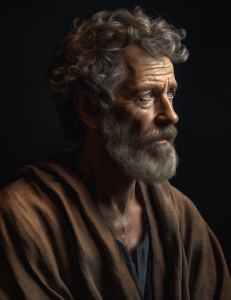 Paul the Apostle (c. 5 AD – c. 67 AD): Paul, originally known as Saul of Tarsus, played a pivotal role in the spread of Christianity beyond Jewish communities into the Greco-Roman world. Before his conversion on the road to Damascus, he was a persecutor of Christians. Afterwards, he became perhaps the most significant early Christian missionary. His epistles (letters) to early Christian communities form a substantial portion of the New Testament. Paul’s theological insights and emphasis on grace, faith, and the Christ event as central to salvation have profoundly influenced Christian thought and practice. His missionary journeys across the Mediterranean, establishment of Christian communities, and enduring written legacy through his letters have made him a central figure in Christian history and theology.
Paul the Apostle (c. 5 AD – c. 67 AD): Paul, originally known as Saul of Tarsus, played a pivotal role in the spread of Christianity beyond Jewish communities into the Greco-Roman world. Before his conversion on the road to Damascus, he was a persecutor of Christians. Afterwards, he became perhaps the most significant early Christian missionary. His epistles (letters) to early Christian communities form a substantial portion of the New Testament. Paul’s theological insights and emphasis on grace, faith, and the Christ event as central to salvation have profoundly influenced Christian thought and practice. His missionary journeys across the Mediterranean, establishment of Christian communities, and enduring written legacy through his letters have made him a central figure in Christian history and theology.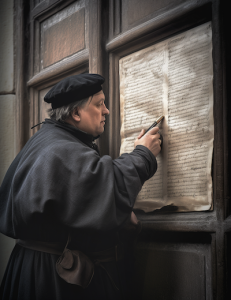 Martin Luther (1483 AD – 1546 AD): Martin Luther was a seminal figure in the Protestant Reformation. His posting of the Ninety-Five Theses on the door of the Wittenberg Castle Church in 1517 protested against the sale of indulgences and other ecclesiastical abuses. Luther’s translation of the Bible into German made the scriptures more accessible to the general public, which had a tremendous impact on the church and German culture. His teachings on justification by faith alone, the priesthood of all believers, and the authority of the scriptures over church tradition fundamentally changed the Christian landscape, leading to the formation of the Lutheran Church and influencing other Protestant traditions.
Martin Luther (1483 AD – 1546 AD): Martin Luther was a seminal figure in the Protestant Reformation. His posting of the Ninety-Five Theses on the door of the Wittenberg Castle Church in 1517 protested against the sale of indulgences and other ecclesiastical abuses. Luther’s translation of the Bible into German made the scriptures more accessible to the general public, which had a tremendous impact on the church and German culture. His teachings on justification by faith alone, the priesthood of all believers, and the authority of the scriptures over church tradition fundamentally changed the Christian landscape, leading to the formation of the Lutheran Church and influencing other Protestant traditions.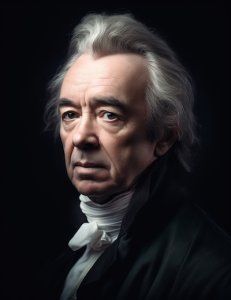 William Wilberforce (1759 AD – 1833 AD): William Wilberforce was a British politician, philanthropist, and a leader of the movement to stop the slave trade. A profoundly religious man, Wilberforce was convinced of the moral wrongness of slavery and spent much of his life campaigning against it. His efforts culminated in the passage of the Slave Trade Act in 1807, which abolished the slave trade in the British Empire, and eventually the Slavery Abolition Act of 1833, which outlawed slavery itself throughout the British colonies. His dedication to social reform also extended to issues like animal cruelty and education for the poor, making him a key figure in the social justice movements of his time.
William Wilberforce (1759 AD – 1833 AD): William Wilberforce was a British politician, philanthropist, and a leader of the movement to stop the slave trade. A profoundly religious man, Wilberforce was convinced of the moral wrongness of slavery and spent much of his life campaigning against it. His efforts culminated in the passage of the Slave Trade Act in 1807, which abolished the slave trade in the British Empire, and eventually the Slavery Abolition Act of 1833, which outlawed slavery itself throughout the British colonies. His dedication to social reform also extended to issues like animal cruelty and education for the poor, making him a key figure in the social justice movements of his time. Florence Nightingale (1820 AD – 1910 AD): Florence Nightingale, known as “The Lady with the Lamp,” was a British social reformer and the founder of modern nursing. She came to prominence while serving as a manager and trainer of nurses during the Crimean War, where she organised care for wounded soldiers. She established the first scientifically based nursing school, the Nightingale School of Nursing, at St. Thomas’ Hospital in London in 1860. Nightingale’s efforts to reform healthcare significantly improved the quality and respectability of the nursing profession. Her work in statistics, especially in data visualisation, significantly contributed to the development of medical epidemiology.
Florence Nightingale (1820 AD – 1910 AD): Florence Nightingale, known as “The Lady with the Lamp,” was a British social reformer and the founder of modern nursing. She came to prominence while serving as a manager and trainer of nurses during the Crimean War, where she organised care for wounded soldiers. She established the first scientifically based nursing school, the Nightingale School of Nursing, at St. Thomas’ Hospital in London in 1860. Nightingale’s efforts to reform healthcare significantly improved the quality and respectability of the nursing profession. Her work in statistics, especially in data visualisation, significantly contributed to the development of medical epidemiology.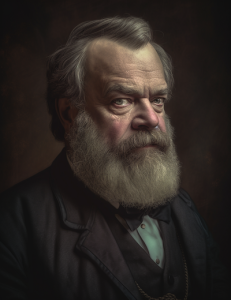 Dwight L. Moody (1837 AD – 1899 AD): Dwight Lyman Moody was an American evangelist and publisher who founded the Moody Church, Moody Bible Institute, and Moody Publishers. One of the most famous evangelists of the 19th century, Moody led a revivalist movement in the United States and Britain, preaching to millions of people and converting many to Christianity. His emphasis on a personal relationship with Jesus Christ and the need for the Holy Spirit’s empowerment in life and ministry had a lasting impact on evangelical Christianity. Moody’s educational and publishing efforts aimed to provide quality Christian education and literature to support the spiritual growth of believers.
Dwight L. Moody (1837 AD – 1899 AD): Dwight Lyman Moody was an American evangelist and publisher who founded the Moody Church, Moody Bible Institute, and Moody Publishers. One of the most famous evangelists of the 19th century, Moody led a revivalist movement in the United States and Britain, preaching to millions of people and converting many to Christianity. His emphasis on a personal relationship with Jesus Christ and the need for the Holy Spirit’s empowerment in life and ministry had a lasting impact on evangelical Christianity. Moody’s educational and publishing efforts aimed to provide quality Christian education and literature to support the spiritual growth of believers.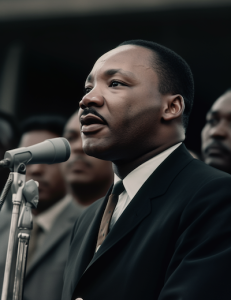 Martin Luther King Jr. (1929 AD – 1968 AD): Martin Luther King Jr. was an American Baptist minister and activist who became the most visible spokesperson and leader in the Civil Rights Movement from 1955 until his assassination in 1968. King was known for his role in advancing civil rights using nonviolent civil disobedience based on his Christian beliefs. He led the 1955 Montgomery bus boycott and helped found the Southern Christian Leadership Conference in 1957. He delivered the iconic “I Have a Dream” speech during the 1963 March on Washington, advocating for an end to racism. King was awarded the Nobel Peace Prize in 1964 for combating racial inequality through nonviolent resistance.
Martin Luther King Jr. (1929 AD – 1968 AD): Martin Luther King Jr. was an American Baptist minister and activist who became the most visible spokesperson and leader in the Civil Rights Movement from 1955 until his assassination in 1968. King was known for his role in advancing civil rights using nonviolent civil disobedience based on his Christian beliefs. He led the 1955 Montgomery bus boycott and helped found the Southern Christian Leadership Conference in 1957. He delivered the iconic “I Have a Dream” speech during the 1963 March on Washington, advocating for an end to racism. King was awarded the Nobel Peace Prize in 1964 for combating racial inequality through nonviolent resistance.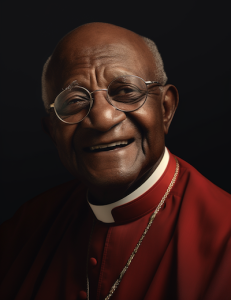 Desmond Tutu (1931 AD – 2021 AD): Desmond Mpilo Tutu was a South African Anglican bishop and theologian known for his anti-apartheid and human rights activist work. He was the Bishop of Johannesburg from 1985 to 1986 and then the Archbishop of Cape Town from 1986 to 1996, in both cases being the first black African to hold the position. Theologically, he sought to fuse the Anglican tradition with African traditions and was a prominent leader in the crusade for a democratic and free South Africa. Tutu’s work earned him the Nobel Peace Prize in 1984. He was also known for his work as the Truth and Reconciliation Commission Chair, a body assembled in South Africa after the abolition of apartheid.
Desmond Tutu (1931 AD – 2021 AD): Desmond Mpilo Tutu was a South African Anglican bishop and theologian known for his anti-apartheid and human rights activist work. He was the Bishop of Johannesburg from 1985 to 1986 and then the Archbishop of Cape Town from 1986 to 1996, in both cases being the first black African to hold the position. Theologically, he sought to fuse the Anglican tradition with African traditions and was a prominent leader in the crusade for a democratic and free South Africa. Tutu’s work earned him the Nobel Peace Prize in 1984. He was also known for his work as the Truth and Reconciliation Commission Chair, a body assembled in South Africa after the abolition of apartheid.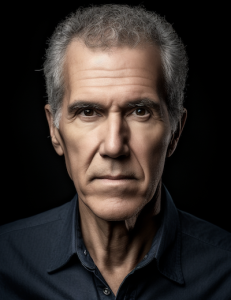 Nicky Gumbel (1955 AD – Present): Nicky Gumbel is a British Anglican priest and the pioneer of the Alpha Course, an introductory course to the Christian faith attended by millions worldwide. Gumbel took over the running of Alpha at Holy Trinity Brompton Church in London in 1990 and transformed it from a local course for new Christians into a global phenomenon. The Alpha Course has been instrumental in evangelism and church growth, offering a relaxed, friendly, and welcoming approach to exploring the big questions of life and the basics of Christian faith. Gumbel’s work through Alpha has significantly impacted global Christianity by facilitating open discussions about faith, life, and God.
Nicky Gumbel (1955 AD – Present): Nicky Gumbel is a British Anglican priest and the pioneer of the Alpha Course, an introductory course to the Christian faith attended by millions worldwide. Gumbel took over the running of Alpha at Holy Trinity Brompton Church in London in 1990 and transformed it from a local course for new Christians into a global phenomenon. The Alpha Course has been instrumental in evangelism and church growth, offering a relaxed, friendly, and welcoming approach to exploring the big questions of life and the basics of Christian faith. Gumbel’s work through Alpha has significantly impacted global Christianity by facilitating open discussions about faith, life, and God.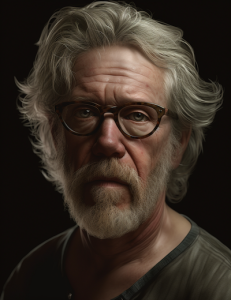 Philip Yancey (1949 AD – Present): Philip Yancey is an American author who writes about questions and topics involving the Christian faith that many find difficult or controversial. Yancey has won numerous awards for his writing, including thirteen Gold Medallion Awards from the Evangelical Christian Publishers Association. His books, such as “What’s So Amazing About Grace?” and “The Jesus I Never Knew,” explore the depth of God’s grace and the person of Jesus Christ in a way that seeks to make faith relevant to a broader audience. Yancey’s writings encourage readers to grapple with their faith and doubts, emphasising God’s love and grace amidst suffering and confusion.
Philip Yancey (1949 AD – Present): Philip Yancey is an American author who writes about questions and topics involving the Christian faith that many find difficult or controversial. Yancey has won numerous awards for his writing, including thirteen Gold Medallion Awards from the Evangelical Christian Publishers Association. His books, such as “What’s So Amazing About Grace?” and “The Jesus I Never Knew,” explore the depth of God’s grace and the person of Jesus Christ in a way that seeks to make faith relevant to a broader audience. Yancey’s writings encourage readers to grapple with their faith and doubts, emphasising God’s love and grace amidst suffering and confusion.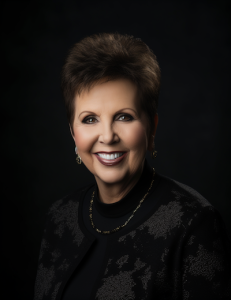 Joyce Meyer (1943 AD – Present): Joyce Meyer is an American Charismatic Christian author, speaker, and president of Joyce Meyer Ministries. Born in St. Louis, Missouri, Meyer’s teachings focus on practical aspects of Christianity, encouraging people to live a joyful and purposeful life in Christ. Her ministry provides resources and teachings through radio, television, and online platforms, reaching a global audience. Meyer’s candid communication style and her teachings on overcoming adversity, based on her experiences, have resonated with many. Her books, including “Battlefield of the Mind,” emphasise the importance of thoughts and attitudes in Christian life.
Joyce Meyer (1943 AD – Present): Joyce Meyer is an American Charismatic Christian author, speaker, and president of Joyce Meyer Ministries. Born in St. Louis, Missouri, Meyer’s teachings focus on practical aspects of Christianity, encouraging people to live a joyful and purposeful life in Christ. Her ministry provides resources and teachings through radio, television, and online platforms, reaching a global audience. Meyer’s candid communication style and her teachings on overcoming adversity, based on her experiences, have resonated with many. Her books, including “Battlefield of the Mind,” emphasise the importance of thoughts and attitudes in Christian life.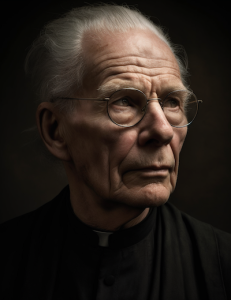 Brother Andrew (1928 AD – 2022 AD): Brother Andrew, born Anne van der Bijl, was a Dutch Christian missionary famous for smuggling Bibles into communist countries during the Cold War, earning him the nickname “God’s Smuggler.” He founded Open Doors, which supports persecuted Christians in over 60 countries worldwide. Brother Andrew’s efforts to bring Bibles and Christian literature to believers in restricted nations have inspired countless Christians to pray for and support the persecuted church. His life’s work underscores the importance of religious freedom and the power of the Bible to transform lives.
Brother Andrew (1928 AD – 2022 AD): Brother Andrew, born Anne van der Bijl, was a Dutch Christian missionary famous for smuggling Bibles into communist countries during the Cold War, earning him the nickname “God’s Smuggler.” He founded Open Doors, which supports persecuted Christians in over 60 countries worldwide. Brother Andrew’s efforts to bring Bibles and Christian literature to believers in restricted nations have inspired countless Christians to pray for and support the persecuted church. His life’s work underscores the importance of religious freedom and the power of the Bible to transform lives.
You left out one of the greatest preachers of our generation without a doubt. John MacArthur. Thank you for your informative article. It was well written and the Lord bless you in all of your other articles!
Hi. Thank you for dropping by and your thoughts. I will create a new blog with some additional influential Christians including John McArthur.
Hi, thanks for the comment. I’ve just added another 50 Christians, commencing with your suggestion of John MacArthur. https://wheelchairjohn.com/2025/01/26/another-50-famous-christians-in-history/